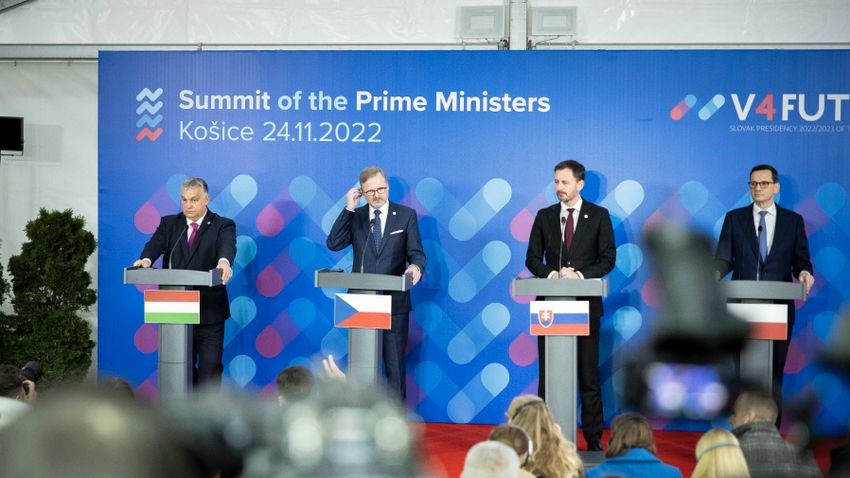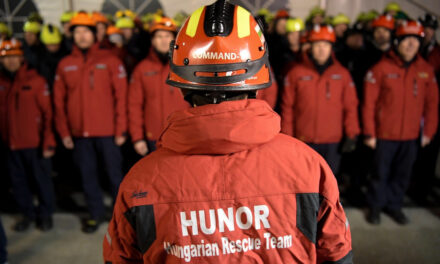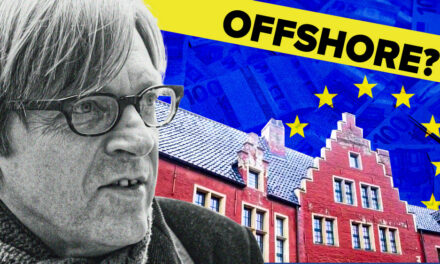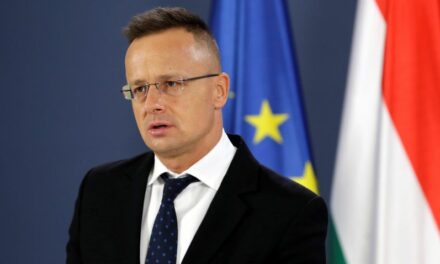Concrete and difficult topics connect the Visegrad countries, and questions arising on these topics are answered more easily together than separately, so the Visegrad Four (V4) still has a future, Prime Minister Viktor Orbán said on Thursday in Kassa, Slovakia.
At the summit meeting of the prime ministers of the Visegrad countries (V4: Czech Republic, Poland, Hungary and Slovakia), Viktor Orbán highlighted: common challenges are illegal migration, the energy crisis, the prevention of economic recession and the protection of the external Schengen borders.
He reminded: the Visegrad cooperation is a thirty-year success story, and it was created because the countries were convinced that they have common interests and many common positions.
The Prime Minister explained:
Hungary is in a special situation because it is the only country in Europe that has to deal with two migrant crises at the same time. This year, more than one million Ukrainian refugees arrived in Hungary, and this year more than 250,000 illegal border crossing attempts were stopped at the southern borders of the country, he explained.
He said: since a protracted war is to be expected in Ukraine, the migration pressure coming from there will increase in the next period, and it is a fair demand on the part of the V4 that the EU also take on some of this burden. It should also be expected that migration pressure from the south will increase in the coming period, so he informed his colleagues that a new formation was created with Serbia and Austria, the purpose of which is to help each other in border protection, Viktor Orbán said.
He also reported on it and asked his colleagues to consider whether they could contribute to the Serbian-Austrian-Hungarian border defense cooperation. He received a positive response, so at the next tripartite meeting to be held in Vienna, he recommends that the Serbian president and the Austrian chancellor accept the offers made by the Czech Republic, Slovakia and Poland, he said.

When asked, he also spoke about the fact that the Hungarian parliament has a resolution in which he described what kind of European Union they want. The war swept it away, but there was a debate about the future of Europe, and every country expressed its opinion, including Hungary, he recalled.
He said: this was recorded in a parliamentary decision, and it is in the fact that " we envision a European Parliament with reduced powers", not directly elected, but operating on the basis of national delegations in the future.
"This is a casus belli in the eyes of the European Parliament, so we cannot expect that we will ever get even a single good word from them, since we questioned the position of the representatives sitting there."
Viktor Orbán stated that all obstacles between the European Commission and Hungary, which had hindered the agreement until now, have been removed.
He explained: they agreed on a package of 17 points with the European Commission, "they told us what they wanted", then "we concretized these and implemented them".
He said: now they expect the board to make a decision at the committee meeting on November 30. "We have fulfilled everything we undertook and agreed on," he declared.
He noted: since then, there is already an eighteenth demand, but they also agreed that it will be fulfilled, but its deadline will be in March.
The prime minister also said that the V4 includes four sovereign states, and everyone decides for themselves about military assistance, which is a sovereign state competence.
He emphasized: There is agreement in the V4 regarding the strategic goals of Ukraine and Russia. Hungary also thinks that Russia cannot pose a threat to Europe's security, and it is important that between the NATO member states and Russia there is always a sovereign Ukraine that can preserve its territorial integrity, he explained.
The prime minister elaborated on this: Hungary supports Ukraine financially, it has already allocated the money for this, but it does not support the European Union getting into debt.
He pointed out: regarding the financial support of the Ukrainians, Hungary indicated its position to the European Commission in time, "we said in advance that we support the financial assistance of Ukraine", this is correct and necessary. They also indicated that Hungary will bear the financial burden of this.
He emphasized: it is 18 billion euros, the part of which belongs to Hungary has already been allocated by the government in the budget, and this money will be given to the Ukrainians. The Minister of Foreign Affairs has already been authorized to discuss this matter, he said.
He stated: "but we will not support any solution that takes the European Union further in the direction of the debt community".
So "we take on our share of the burden, but we don't want to do this through the Union, because we think it is not a good direction for the Union to go into the future in more and more cases, with ever greater amounts of debt to itself and its member states".
Source: MTI
Photos: Prime Minister's Press Office/Zoltán Fischer












